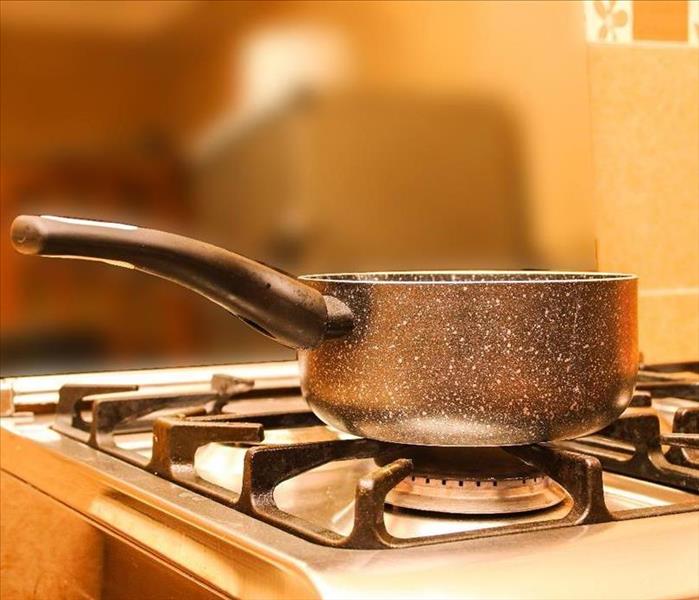How To Deal With a Kitchen Fire
9/15/2020 (Permalink)
Cooking in your kitchen often includes heat of some sort, which makes it an area prone to fire hazards. However, there are several steps you can take in the event that you experience a kitchen fire due to hot oil, a stovetop nightmare, a microwave disaster, or any other cause. Kitchen fires are terrifying and can be costly, but that doesn’t mean that you can’t be prepared to deal with them. Since kitchen fires are the leading cause of fire injuries and home fires, it’s important to know what to do if a grease fire or another type of kitchen fire occurs to prevent it from spreading to the rest of your home.
- Never, ever put water on a grease fire.
Grease fires should be smothered and then left to fizzle out the rest of the way on their own. Instead of extinguishing a grease fire, water often causes the oil that caused the fire to splash, which can encourage the fire to spread. A good tip is to keep the pot or pan lid nearby at all times when cooking, and in the event of a grease fire, grab an oven mitt to use the lid to place over the fire.
- Close the oven or microwave door if there’s a fire in either appliance.
Spy a fire in one of your kitchen appliances? Don’t open the door! The lack of oxygen inside each appliance while shut should suffocate the flames. On the contrary, opening the microwave or oven door will feed the flames with oxygen, allowing the fire to stoke and spread. However, if your oven or microwave continues to smoke while closed and you suspect a fire may be raging inside it for a while, call your local fire department to come out and take care of it.
- Use a fire extinguisher.
If the kitchen fire is too big to smother with a pot or pan lid, grab your fire extinguisher and aim it at the base of the fire. Don’t spray the fire extinguisher at the flames. The flames stem from the base of the fire, which is what you want to extinguish because once the base of the fire is put out, the flames will follow. Remember to pull the pin out, aim low, squeeze the handle, and sweep the extinguisher back and forth from side to side at the fire’s base.
- Don’t throw flour at a fire. Try baking soda or salt instead. Flour is prone to exploding, which is the opposite of what you want to happen, as this may make the fire worse. Baking soda or salt may be enough to smother a small grease fire if you have nothing else close by on hand to combat the fire with.
Are you dealing with the aftermath of a kitchen fire? For professional help dealing with smoke damage, fire damage, or deodorization, contact the fire disaster restoration professionals at SERVPRO of Belle Meade/West Nashville by calling (615) 242-9391. We have years of experience restoring properties after fire, water, storm, and mold damage, and we are available 24/7 to respond to emergencies that come your way.






 24/7 Emergency Service
24/7 Emergency Service
